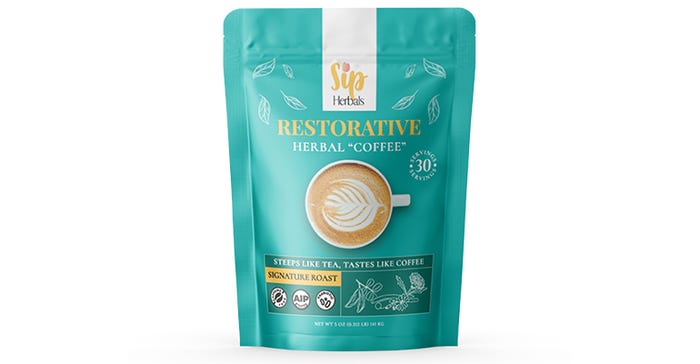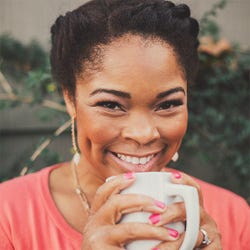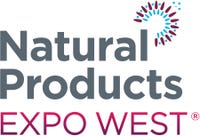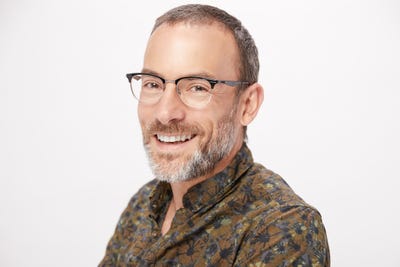February 1, 2023

Last year, (included) CPG, a collective of BIPOC founders and executives in consumer packaged goods, launched (included) ACCESS, a retail growth accelerator that prepares BIPOC food and beverage founders for trade shows. New Hope Network, as part of its mission to create health, joy and justice for all people while regenerating the planet, has been a partner in this accelerator. The eight-week cohort concludes with sponsored exhibition and programming at Natural Products Expo West in March.
The 10 emerging brands participating in this cohort will exhibit in booths N1530-N1539 in the North Hall, level 200. In each issue of Expo West Show Scoop through March 1, we will introduce you to two ACCESS members.
When Sip Herbals co-founder Orleatha Smith learned she had an autoimmune condition, she knew she'd need to change the way she ate. The biggest challenge of her new anti-inflammatory diet wasn't the foods she had to eat. Having been in the wellness industry for over a decade, healthy nutrition was nothing new.
Her big issue was what she couldn't consume—specifically, coffee.
"My business partner (Kelly Raulerson) also has an autoimmune condition and she was like, 'OK, no problem," Smith remembers. "But I was like, 'I'm not giving up coffee! Tea doesn't cut it!' I had to figure something out."
Together, the two researched other coffee substitutes, only to discover they either contained either "weird" ingredients or adaptogens, which can aggravate certain autoimmune conditions.
Smith got to work. She experimented with a few herbs in her kitchen and developed a steepable herbal blend that offers that satisfying, rich coffee experience. After getting the thumbs up from a few friends, Smith and Raulerson launched a Kickstarter campaign that drummed up $7,000. Using their e-commerce experience, they launched a website and, as Smith puts it, "The rest is history."

You sell products specifically targeted at people with autoimmune issues. How do you navigate any medical claims associated with that?
Smith: We don't make any medical claims. If you're on a diet that excludes coffee, here's a really great, very simple product. You can understand these three herbs substitute that will give you the body and the feel of coffee. If you have an autoimmune condition, you have so many things taken away from you. So, we don't make any claims, we're just like giving you back your morning ritual. It's for the autoimmune community by the autoimmune community.
But you don't have to have an autoimmune condition to enjoy it.
OS: Nope. A lot of pregnant women choose our product because, again, it doesn't have any adaptogens. It doesn't have any weird flavors. It doesn't have any caffeine or acidity, but it still gives you that body, so you can add your creamer and have that warm hug in a cup.
The one thing I just never want to walk away from is that coffee feeling.
OS: Yes, exactly that first sip and it's like, oh!
It's not the caffeine, it's the… niceness.
OS: I feel ya. I went kicking and screaming. I was like, no, there's no way.
How has the (included) ACCES S program helped you prepare for the Natural Products Expo West?
S program helped you prepare for the Natural Products Expo West?
OS: We are in a cohort which also gives us access to a lot of information and a lot of wisdom that we would not have had otherwise. We were planning on going to Expo West last year, but just got so overwhelmed with the idea of how to prepare without access to the information needed.
You can have a great product, you can have all the money in the world, but if you don't have the wisdom, then it's going to be a waste.
In the natural food space, what challenges have you faced as a Black woman founder—or would you prefer BIPOC founder?
OS: I'll choose Black woman. My business partner is Black and Filipino, so she would probably choose BIPOC. The biggest challenge is access to information. A lot of people have connections. For instance, fundraising is really not as challenging if you have friends and family who can give you that first raise. In our situation, we didn't have that. I'm a first-generation college graduate. In our situation, that wasn't even an option to go to our friends and family.
Even if we did go to them and they did have the finances, we don't have the connections to know what to do next. How do we find the packaging? What do we need on our packaging? How do we get on the shelves? The resources and the wisdom are just not there. Black women receive less than 1% of VC dollars. So that's a huge, huge challenge.
Have you hit barriers, like people not returning your calls, because you're Black?
OS: For sure. Right after Christmas, our co-packer decided that they were going to not honor their contract and triple our prices because they saw that we had a great Black Friday. I talked to other people that they co-pack for, so I know they didn't do that to them. So, why'd they do that to us?
We spent the entire New Year weekend moving our product, finding a new co-packer. Things like that where you know that someone is doing it because they have the power to do it and they didn't do it to other people. It's really disheartening, but I'm not going give up.
Now that you have access to resources like (included) ACCESS, are you trying to pay it forward, to dispel that "old boys network" mentality and create a new network where people don't do that to each other?
OS: Yes. I talk to different founders of different ethnicities and different genders and different everything who may not fit into the old boys network. We share information.
I was just on a call today with a founder who makes chicken and waffle mix. She's in Target. She's doing these great things. And guess what? She had the same situation with a co-packer! We were like, let me see how I can help you. I know this person. Let me connect you. That is what I'm doing to pay it forward, because I don't think that anyone ever needs to struggle like this.
If we can make it better for the next person, then the world will be a better place. It'll just be better if people have an easier road as opposed to "I had to struggle, you struggle too." No, it's not going get us moving forward as a nation, as a people, as anything. We're just going be stuck.
Are you in any retailers right now?
OS: We are in a retailer in Canada called Natura Market, and here in the U.S. we had a small boutique in the Poconos, but they went out of business, so we are in Amazon and hoping to get into some retailers and/or food service here soon.
It seems like a logical product for Whole Foods or Sprouts or those type of places.
OS: Or Erewhon or Plum Market, where we shop because we have allergies and we have to shop there!
What do you hope to accomplish at the Natural Products Expo West?
OS: I would really love to connect with other makers, other co-founders, and learn from other people's experiences and increase our network.
 The founders of the first (included) ACCESS cohort brands will each share their stories during a special session at Natural Products Expo West. Brand Spotlight: Discover 10 Innovative BIPOC Brands Shaking Up Expo West begins at 1 p.m. Wednesday in Grand Ballroom E of the Marriott. You'll also hear from industry allies Naturally Network, J.E.D.I. Collaborative, (included), Project Potluck and Fila Manila.
The founders of the first (included) ACCESS cohort brands will each share their stories during a special session at Natural Products Expo West. Brand Spotlight: Discover 10 Innovative BIPOC Brands Shaking Up Expo West begins at 1 p.m. Wednesday in Grand Ballroom E of the Marriott. You'll also hear from industry allies Naturally Network, J.E.D.I. Collaborative, (included), Project Potluck and Fila Manila.
About the Author
You May Also Like






